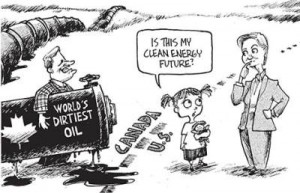Ecothinking and Marx
There’s a great video available on YouTube right now, A link between climate change and Joplin tornadoes? Never. Based on a 5/23 Washington Post op-ed by Bill McKibben of 350.org (and narrated and illustrated by Stephen Thomson of Plomomedia), it sarcastically tells us that “It is vitally important not to make connections.”
Of course the intent is the opposite: McKibben does want us to make connections. These days, however, we’re often so bedazzled by spectacle (including disaster footage) as to feel powerless about the point of information that connects to anything else.
But if not connect now, when?
In the video we see extreme weather events, including recent tornadoes in the Midwest; wildfires in Texas and droughts in New Mexico; flooding in Mississippi, and record rainfall elsewhere. “Do not wonder if they’re somehow connected,” the narrator warns. Do not wonder…. because it’s imperative to have a passive populace, of course – one that’s transfixed by looking instead “at the news anchorman standing in his waders in the rising rivers as the water approaches his chest,” or similar “oh-wow”-human-interest angles.
It’s far too hard to look at facts, or to ask whether government policies (such as allowing more coal mining or exploiting Alberta’s tarsands) even begin to make sense when it comes to global welfare…
So how about some facts for the next time you get up off the couch and head to the fridge? According to The rising cost of food – get the data (published on June 7, 2011), global food prices this year are still 37% higher than they were last year. And there’s no relief in sight as “high and volatile food prices are also likely to prevail for the rest of the year, and into 2012.”
What’s driving this rise, which has propelled the food price index from 92 in January 2001 to 232.4 in May 2011? Theories abound, including ones around weather (too much and/or too little rain fall); a growing population (including a demand for meat in China); concentration of corporate control; and the use of food for biofuel.
But maybe the following angle, alluded to in The Guardian, reveals an aspect that vitally deserves to be connected to other facts and insights: As the article notes, there is a
massive influx of big investors into deregulated commodities markets – searching for a “safe bet” after the dotcom bubble burst – who speculate on the future price of food. On Sunday, a UN conference on trade and development said it may be necessary for governments to intervene with regulation to rein in rising food prices. The FAO adds that more must be done to improve transparency in global food markets. (source)
Ok, let’s take that “dot” and connect it to another approach, courtesy of Bob Burnett’s recent article, Roll Over, Karl Marx (June 10, 2011). When you start to think about climate change and weather disasters in conjunction with environmental despoliation and rising food prices, and plug some of that into a political analysis, you have to get politicized …which is probably very dangerous to our ruling class.
Ruling class? Why, what’s this? Class warfare?
Well, yes, it’s shaping up that way, isn’t it? Except, of course, for the lethargy of the key players…
Burnett summarizes Marx and marxist thought in broad strokes, from the Industrial Age to the later 20th century, when income inequality (Johnson Administration) lessened …before picking up again. By 2007, income inequality had reached a historic high. What’s up with that?
In the meantime, our more recent Great Recession has hugely exacerbated that imbalance while it’s also busily eviscerating the middle class – which of course leads to more polarization. Yet the populace remains docile, even in the face of environmental despoliation (which is causing disasters world-wide) and significant rises in the cost of living, particularly food prices.
Burnett addresses several factors Marx (who expected that any class under such pressure would revolt) could not have foreseen: multinational corporations; a corporate-controlled mainstream media that owns the airwaves and your eyeballs; a PR campaign that remade our perception of corporate strategy (convincing us that trickle-down economics actually work, for example), or that “markets are inherently self correcting and there is no need for government regulation.” Burnett notes, the “consequences were devastating to workers, the environment, and the American economy,” particularly as jobs went overseas while wages stagnated. Union power / collective bargaining rights were undermined or destroyed, and – most significantly – instead of being perturbed by this loss of real power, people became distracted with questions about fundamentalist religion and issues like abortion – both of which “ divert attention from poor wages and living conditions.”
It doesn’t help that the Democratic Party is (as Burnett puts it) “capitalism lite,” leaving the non-capitalist crowd without a champion in the political arena.
And yet we wonder why Obama has been so wishy-washy on the environment. Why we continue to rape the earth – frack it for all it’s worth, for example.
But of course, “It is vitally important not to make connections.”
You should not wonder…
You should instead continue to be distracted by “human interest” stories and ridiculous debates about religion and abortion and other matters that keep people on a slow boil, instead of directing them to fix real problems.
Above all, remember how important it is not to disrupt the record profits of our fuel companies…
Relevant images (links included)
~~~~
~~~~
~~~~
~~~~




No Comments yet
Sorry, the comment form is closed at this time.